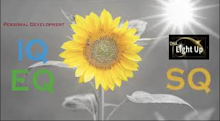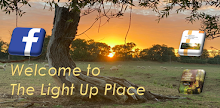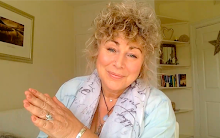I’ve had an extraordinarily busy and amazing week working with a fantastic group – which is why I simply didn’t have the time to post anything last week. My apologies. The workshop sessions were intensive, running through from early morning to late evening, and yes, it’s tiring work – both for me as well as for the delegates and, of course, my training team. But goodness me it’s worth it. How do I know? The room filled with smiling faces tells me so, and it makes me feel glad.
So this week I’ve decided to share some of the techniques we were exploring over the course of the workshops – because there are many that, in my experience, also apply to dealing with the sociopaths among us.
The first subject is one I’ve written about before. It’s the question of blame and responsibility. You'll know and recognize the times when the hand raises, the finger starts pointing and out come words like “He said…” or “It’s her fault…” or “My boss is to blame…” as people focus on what’s wrong about something or someone else? Now then, so far as I’m concerned there’s nothing wrong in noticing when something is not right – in actual fact it’s extremely positive and necessary to take regular ‘health checks’ on surrounding circumstances. How else can we know whether or not we’re happy with where we are or what we’re doing? The problem, though, lies when people simply state the ‘blaming’ fact and leave it at that – without doing anything about it, and likely feeling more frustrated in the process.
What Can I Do?
So, instead of automatically leaving things as they are, though, what might happen if we adopted the habit of asking ourselves honestly and gently what we can do about it – even when it seems that things are out of our control? In a group scenario, it’s quite simple to give a visual explanation for this – so I’ll share it here with you now. Imagine pointing your finger out towards whatever is upsetting, annoying or frustrating you – and look at how you hold your hand. Notice that for the one finger that points away, there are three pointing back at you. It's a metaphor that demonstrates if we focus all our attention on what is ‘out there’ we are giving away our power – forgetting that if we focus back in on ourselves, we can both acknowledge our power, and also start to grow self-confidence by flexing what I like to call our Me-Muscles.
What are “Me-Muscles”…? They are the tools that sit within us – within all of us – that are within out power to recognize, acknowledge, and build. I often refer to the work I do as the “inner game” because I know beyond any shadow of a doubt that we have more personal resources within us than most of us realize. I have been learning and experimenting with this fact over many years, and after my experiences with my ex I know for sure that it’s the truth. Because I was able to fall back on the countless skills I’d learned and taught over the years, gradually strengthening my me-muscles and finding myself in the process. Those skills helped me to come through, and as a result, they have become even stronger as a result of my experiences.
That's all well and good, you may be thinking, but how do we do that? How can we find strength and faith in ourselves when all around us seems so hopeless…? It’s a good question – and let me assure you, it’s one I’ve asked myself on numerous occasions, while holding tightly on to the bathroom sink and staring at my tear-streaked reflection!
It’s Not About The Labels
And you know what I’ve learned? I’m aware that my next statement may well seem contentious at first – so please stay with me. Because the fact is I’ve learned that it does little or no good to point out the person who has done me wrong. Whether intentional or not, and whether from a sociopath, a narcissist, a bully, an abuser, a psychopath, an enemy, a back-stabber or just a misguided friend…. It doesn’t matter the label I give the person. It doesn’t matter the name or category that the person (or people) sit. No. At the end of the day, that’s not what counts. What counts is the recognition of the behaviour that they are demonstrating – whether that behaviour is conscious or automatic. Whether it’s deliberate or accidental, manipulation or just mis-guided care. At the end of the day, it’s not important. The label, once again, doesn’t matter. Because what matters is that whatever is happening, whatever we notice (and point our finger at) it’s an opportunity for us to flex our Me-Muscles and say “yes” to what we like and “no” to what we don’t like.
It’s our invitation to go within and find our own resources. Why? Because we’re worth it. How do we do it? By learning techniques. When do we start? As soon as we realize (or, as I was taught many years ago “see with real-eyes”) that we can – or even if we may not believe that we can, perhaps we get an inkling that perhaps it might be possible that we may be able to do a little more than we had previously thought… You get my drift?
Can you begin to imagine the possibilities as more of us not only become more adept at recognizing bad behaviours (within individuals, groups and cultures) but also do something about pointing them out and changing them? I can imagine it… and it gives me goosebumps. Those goosebumps happen every time that I work with a group and hear these words “Nothing’s really changed outside – but I’VE changed, and now I know for sure that I can change my life for the better!”
It all starts with a set of questions. Gentle and honest questions to ourselves. Invitations, if you like, so that we can find ways to tap in to the unknown power that lies within us and learn to reclaim who we are. Those honest questions can be triggered every time that we point the finger out to someone or something else. And instead of just focusing on what’s happening, ask ourselves “How can I influence this? What can I do differently? What else is within my power that I hadn’t already recognized?” And you know what? The responses will start to come.
And if (as at times you will) you hit the brick wall of “I don’t know” – then gently continue your self-dialogue with an acknowledgement and another question “Yes, of course, I realize that I don’t know… but just for a moment or two, supposing I DID know…. Then what…?” And you can smile as the answers slowly start to form.
I hope this is useful, and would welcome your comments and questions :-)







No comments:
Post a Comment